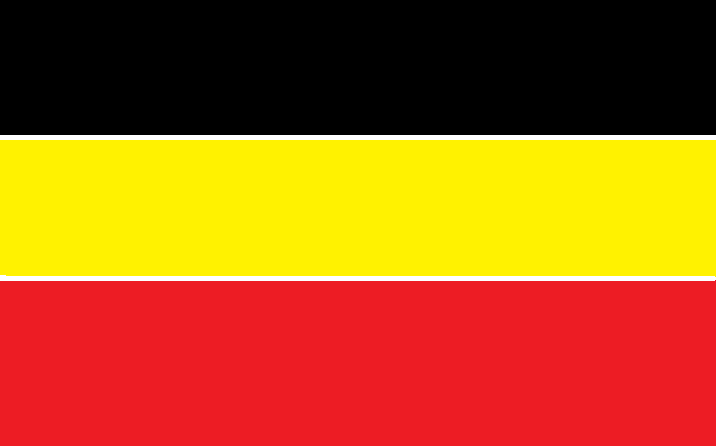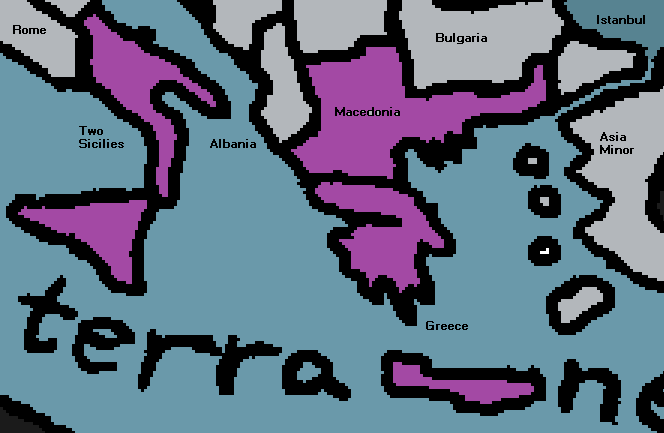JohannaK
Heroically Clueless
Nation Name: Ecumenical Commonwealth of Human Nations
Capital: Ecumenopolis (old Frankfurt am Main)
Flag:

Government: The country is governed from cities, with are the nucleus of the regions and provinces and even shires. The government is run by city assemblies. Rural regions are centred on a city, and every two years they choose a deputy to represent them in the city assembly. At a shire level, every thousand people elect a deputy in the assembly. Each city/shire elects via its assembly a number of deputies proportional to its population for provincial assembly. The capital of a province is run by the province assembly. Province assemblies elect a number of deputies proportionate to population to region assemblies. Region capitals can’t be the seat of a shire or province assembly. Regions elect a representative to the Grand Council. The Grand Council meets at Ecumenopolis, and is the Executive Branch of the government. Each province also elects a representative to the Grand Assembly, the legislative chamber.
The constitution specifies this hierarchy and its only true disposition is that every Assembly can be ruled independently from any other assembly on its level unless it violates a ruling of a higher Assembly, and that all decisions approved by any Assembly by any kind of majority shall be imposed over all of its members. Everyone can vote in Assemblies and be elected as representative to any assembly.
History: After the death of the Martian invaders, and as the people of Bavaria and West Germany struggled to rebuild their homes, a new ideology that had been born there during the invasion spread among the industrious German people and the industrious immigrants who, running from the Weed, had arrived to Germany: Ecumenism.
An old idea turned a powerful belief in the mouth of local leaders, that mankind was all one, and that it had to remain united to defeat the Martian menace and so many others that were yet to come. That men had to unite to recover from the deep blows that such menaces would inflict upon individual nations, that a global Commonwealth of Human Nations would be able to better manage the resources of the world and command its people against alien aggression.
Under the banner of ecumenism, the nation structured around some model assemblies, and built up on them. A whole nation grew out of local proto-democracies, with a highly decentralised government and idealistic views of the relations among nations. Of course this nation is seen as a threat to the current order and local stability, but the winds of change have arrived. After the Martian Devastation, no country is enough powerful to defeat its neighbours by itself, and no one can yet stop the Ecumenic vessel from sailing at full speed over the seas of history.
Social and Economic Policies: There are no official parties, but most representatives adhere to an extreme of at least one of the following dichotomies: agriculture-industry, social welfare-private welfare, central government-assemblies, state run economy-free enterprise, protectionism-liberalism. At the moment, the country tends to leftist policies, with moderate social welfare and the state overseeing the functioning of the economy, but the bulk of the decision-making is done by assemblies at regional or provincial level. In extreme cases, shires have pressed their representatives to force the provincial assemblies to take decisions on crop or industrial surpluses that were stocking and losing value. Provinces are free to direct trade on their own, motivating an efficient distribution of surpluses in neighbouring or close regions, but causing a logistic mayhem and changing tariffs for every shire. Some shires have grown wealthy thanks to conducting foreign trade in lieu of neighbouring provinces with higher tariffs.
Internal Politics: It is not sure as to how much dissent there is, since the amount of votes for and against are kept secret and decisions are unanimously accepted, but entire districts often commit small acts of civil disobedience that are swiftly repressed by a quiet but very effective provincial militia. A secret police is run on regional level that tries to monitor political trends and opinions at all times and places. The national army is the joint of all provincial militias, and at a national level of government there are several superior officials that are renewed every year or upon death, chosen among militia officers. This structure means that there is no effective police force in times of war, but there are national military standards to join the militias, so that all units can effectively fight like an ordinary, cohesive military force.
Traits: Innovative, decentralised, chaotic, semi-authoritarian.
Claims: Bavaria, West Germany and Rheinland
Capital: Ecumenopolis (old Frankfurt am Main)
Flag:
Spoiler Flag :

Government: The country is governed from cities, with are the nucleus of the regions and provinces and even shires. The government is run by city assemblies. Rural regions are centred on a city, and every two years they choose a deputy to represent them in the city assembly. At a shire level, every thousand people elect a deputy in the assembly. Each city/shire elects via its assembly a number of deputies proportional to its population for provincial assembly. The capital of a province is run by the province assembly. Province assemblies elect a number of deputies proportionate to population to region assemblies. Region capitals can’t be the seat of a shire or province assembly. Regions elect a representative to the Grand Council. The Grand Council meets at Ecumenopolis, and is the Executive Branch of the government. Each province also elects a representative to the Grand Assembly, the legislative chamber.
The constitution specifies this hierarchy and its only true disposition is that every Assembly can be ruled independently from any other assembly on its level unless it violates a ruling of a higher Assembly, and that all decisions approved by any Assembly by any kind of majority shall be imposed over all of its members. Everyone can vote in Assemblies and be elected as representative to any assembly.
History: After the death of the Martian invaders, and as the people of Bavaria and West Germany struggled to rebuild their homes, a new ideology that had been born there during the invasion spread among the industrious German people and the industrious immigrants who, running from the Weed, had arrived to Germany: Ecumenism.
An old idea turned a powerful belief in the mouth of local leaders, that mankind was all one, and that it had to remain united to defeat the Martian menace and so many others that were yet to come. That men had to unite to recover from the deep blows that such menaces would inflict upon individual nations, that a global Commonwealth of Human Nations would be able to better manage the resources of the world and command its people against alien aggression.
Under the banner of ecumenism, the nation structured around some model assemblies, and built up on them. A whole nation grew out of local proto-democracies, with a highly decentralised government and idealistic views of the relations among nations. Of course this nation is seen as a threat to the current order and local stability, but the winds of change have arrived. After the Martian Devastation, no country is enough powerful to defeat its neighbours by itself, and no one can yet stop the Ecumenic vessel from sailing at full speed over the seas of history.
Social and Economic Policies: There are no official parties, but most representatives adhere to an extreme of at least one of the following dichotomies: agriculture-industry, social welfare-private welfare, central government-assemblies, state run economy-free enterprise, protectionism-liberalism. At the moment, the country tends to leftist policies, with moderate social welfare and the state overseeing the functioning of the economy, but the bulk of the decision-making is done by assemblies at regional or provincial level. In extreme cases, shires have pressed their representatives to force the provincial assemblies to take decisions on crop or industrial surpluses that were stocking and losing value. Provinces are free to direct trade on their own, motivating an efficient distribution of surpluses in neighbouring or close regions, but causing a logistic mayhem and changing tariffs for every shire. Some shires have grown wealthy thanks to conducting foreign trade in lieu of neighbouring provinces with higher tariffs.
Internal Politics: It is not sure as to how much dissent there is, since the amount of votes for and against are kept secret and decisions are unanimously accepted, but entire districts often commit small acts of civil disobedience that are swiftly repressed by a quiet but very effective provincial militia. A secret police is run on regional level that tries to monitor political trends and opinions at all times and places. The national army is the joint of all provincial militias, and at a national level of government there are several superior officials that are renewed every year or upon death, chosen among militia officers. This structure means that there is no effective police force in times of war, but there are national military standards to join the militias, so that all units can effectively fight like an ordinary, cohesive military force.
Traits: Innovative, decentralised, chaotic, semi-authoritarian.
Claims: Bavaria, West Germany and Rheinland









